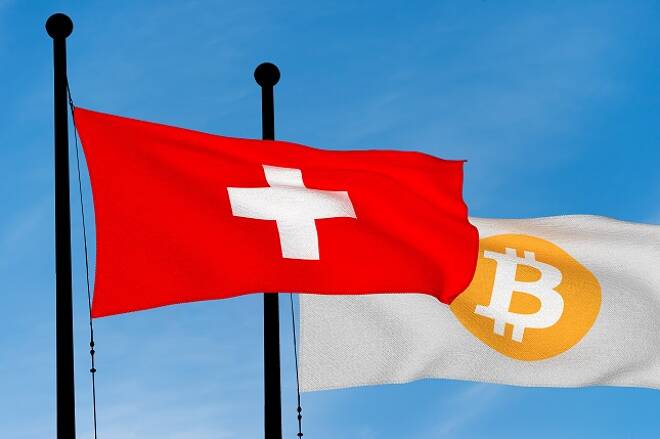Advertisement
Advertisement
Will Switzerland Save Cryptocurrencies?
By:
Of all the places in the world to hold assets - one of the first, if not the first, to come to mind is Switzerland. Neutral, fairly isolated, rich, discreet, and conservative – it has long been the first choice for anyone wanting to secrete any kind of asset in the vaults beneath the streets of Zürich, Bern, and Basel.
Its location, nestled between Germany, France, Austria, and Italy; coupled with its rugged, mountainous terrain, have, for millennia, made it a perfect place to hide. Many of the world’s richest citizens count themselves amongst the 8 million inhabitants of Switzerland. Indeed, the country is the wealthiest in the world in per capita terms and has the 19th largest economy. Switzerland has no natural resources.
A large share of its income is from manufacturing. Pharmaceuticals account for around 6% of GDP – around 30% of exports – and many watches, and fine engineering companies, are based in the country. By far the biggest earner, though, is “banking,” and “wealth management.” This accounts for most of Switzerland’s historic and current affluence.
The main Swiss banks command a huge global presence – as well as UBS, Credit Suisse, Julius Baer, Pictet, and Lombard Odier – who are Swiss Banks, there are around 16 banks incorporated in the country, and about a dozen, family-owned banks based there. In addition, there are scores of international banks who have branches in Switzerland.
Back in 1934 the government, at the time, saw a way of capitalizing on the political situation in Europe and enacted secrecy laws for such banks, this allowed the identities of account holders to be withheld, enabling people to deposit unlimited wealth in Swiss vaults, knowing they were both safe, and private. This has served Switzerland well ever since. Until recently.
The Patriot Act in the US, and actions by European countries, seeking to stifle the money laundering of terrorists, and organized crime groups, has led to a steady erosion of privacy and confidentiality. There is now a US Terrorist Finance Tracking Program which uses sophisticated methods of obtaining information. For this reason, it is often better for the Swiss banks to quietly hand over the details of their account holders than it is for them to have their records hacked, and their encryption methods discovered. Combine this with the acceleration of whistleblowing (Bradly Birkenfeld), and breaches like WikiLeaks and the Panama Papers, and suddenly keeping your assets quiet doesn’t seem to be so easy.
Switzerland, though, has been looking to find other avenues to keep the account details of its clients confidential – and away from prying eyes and the tax authorities. These are not just rich individuals it is trying to protect, but organizations, banks, international companies, and trusts – countries, too, and the leaders of some of those countries.
It now seems the very technology which was about to cause the demise of the Swiss finance sector has now rescued Switzerland. Secure computer systems, using public-key cryptography (a type of financial cryptography) and anonymous financial instruments such as electronic money, and digital bearer certificates have now become so advanced that they can now provide the beefed-up security modern tax evasion, money laundering, and under-the-table finance, need.
If this sounds familiar – it ought to. It is a description of the blockchain – transparent transactions – with privacy as a side order. Smart contracts via Ethereum and derivatives of this technology are being rolled out in different forms every day.
Suggested Articles
- How to Buy Litecoin Cash: The Essential Guide
- The Next Cryptocurrency Evolution: Countries Issue their Own Digital Currency
This other niche is growing in a valley city called Zug. This has become a center for raising funds for ICOs. The Swiss Financial Market Supervisory Authority (FINMA) has introduced regulatory guidelines for crypto, Blockchain, and distributed ledger technologies. Of course, the key to this new role is the fact that Switzerland has an estimated $2 trillion – 27% of the global offshore wealth – all looking for investment potential. The kind of returns cryptocurrencies are capable of delivering is far too tempting even for the Gnomes of Zurich (or Zug) to ignore. ICOs will be treated security in Switzerland – and on February 16th, FINMA published its guidelines, which set the ground rules by which cryptos will be handled by the authorities.
The implications of this are enormous. The credibility factor of Switzerland’s financial authority, officially recognizing Bitcoin, cryptocurrencies, ICOs, and the blockchain, as de facto financial instruments – and making them more tradeable, as well as giving them a base – in the most rarefied monetary environment in the world, is likely to be a major step towards them regaining their recent lost ground with investors.
Noble Gold specializes in IRAs and 401(k) rollovers through precious metals and cryptocurrencies investments.
About the Author
Collin Plumecontributor
Advertisement
